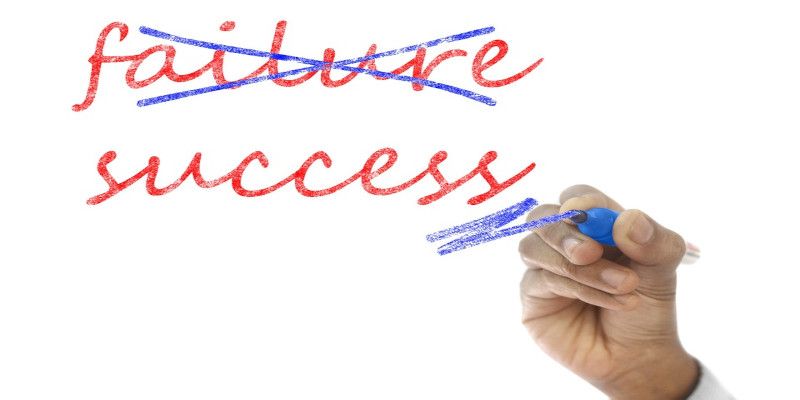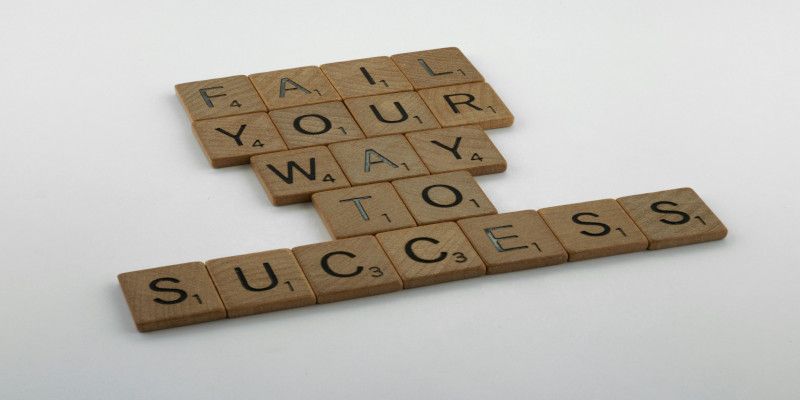Table of Contents
ToggleFailure and success go hand in hand.
We tend to learn the most from our mistakes since we typically experience them as something uncomfortable that we wish to avoid in the future. Thus, this sensation of pain and discomfort incentivizes us to become better to prevent us from going through this trauma again.
Still, failure often has a negative connotation in modern society. Yet, it is extremely valuable, and even necessary to improve. But before we can change, we must possess the willingness to fail. Let me explain why.
How to go from failure to success with the willingness to fail

But how can one go from failure to success? Aren’t these two literal opposites?
Not exactly. They are two sides of the same coin. Yin and yang.
Willingness to fail
The requisite to improve, however, is to develop a willingness to fail. This is the first step towards success because it involves the required courage to take action.
You’ve got to be willing to fail to become good at something since when you start doing something new, you’ll probably be bad at it. Regardless if it’s a new skill or task that you’re trying out. You likely fail multiple times in the beginning.
Everybody that has mastered their craft has gone through this phase. Everyone. Eventually, though, you’ll become better and better at that given skill or task until you become good at it and perhaps, eventually, even master it. That is if you decide to keep at it.
So summarized, you’ve got to be willing to fail since people are rarely experts and successful when they first attempt something. But if you keep practicing, then you will eventually become good at that task.
It takes time to learn and master your craft

All new things in life take time to learn and master. Perfecting a craft is a long road paved through hard work, discipline, and perseverance.
I’m willing to bet that even Tiger Woods, for as much talent as he inherently had, wasn’t nearly as good when he just started playing golf. And he will probably admit that he wasn’t that good at first and had to train hard and countless hours to get decent. To the point where his legacy consists of being called one of, if not the greatest of all time.
We learn the most from our mistakes
success is going from failure to failure until we learn enough to become competent. We typically learn the most from our losses rather than our victories.
Because why would we bother learning new information when we’re already successful at what we’re doing?
Failing is painful. And that’s why we’re more likely to learn from our mistakes to prevent that same dreadful feeling in the future.
What can prevent us from becoming successful?

I’m willing to bet that a lot of people out there don’t fully master even a single given thing during their lifetime. Not necessarily because they’re not talented at it, but because we all have our strengths. But rather because there’s something else that’s holding them back.
The willingness to fail to go from failure to success is something few people possess.
A lot of people are afraid of looking like a fool and are consequently afraid of trying something new. But the unknown is precisely where our growth lies.
They don’t realize their potential

Sounds kinda obvious, right? Some people may not realize how good they could be if they applied themselves to learning something new.
We are, or at least were school students at one point in our lives. Let me ask you this. Who of us doesn’t know, or knew at least one person from their class who was naturally gifted at a course and had to do next to nothing to ace the exam of that course?
However, while that person probably got by and settled for just decent grades by doing the bare minimum to pass, they could’ve had excellent grades if they properly applied themselves.
Perhaps you’ll blow off this particular school example as “I don’t care about school anyway, school sucks and a degree is useless.” But, it’s the same process with every new thing that you’ll ever learn or master during your lifetime.
Even if you are naturally talented at a given skill, without blood, sweat, and tears you’ll never be outstanding.
They don’t have the confidence to undertake something challenging

One of the things that can prevent us from becoming good and successful is a lack of self-confidence.
Perhaps the reason is as simple as the fact that they never did something (or at least not yet) truly difficult in their life. Which is why they’ve never built the necessary confidence to become good at something.
Or maybe it has been instilled within them at a young age that they can’t do anything right and will never amount to anything in their life.
That’s often said by jealous and spiteful people who don’t mean the best for you, regardless of what they might say to deceive you. Actions are a lot more meaningful than words to figure out someone’s true intentions. That’s because actions will always reveal a man’s true character.
If you don’t have the self-assurance to succeed in the challenge, then you’ll never muster up the confidence that you require to start a new challenge.
These are possible reasons that can result in a low amount of self-esteem. And if you have no confidence in yourself or your ability to complete tasks, then how can you be motivated to reach such a seemingly unreachable goal where the standards are incredibly high?
They don’t have the necessary skills to properly apply themselves

Mastering a given skill indeed takes time and effort, and you’ll probably be bad at it when you’re just starting. There are a lot of related skills that you need to possess or develop BEFORE you can reach the title of master at any given skill.
Abilities like perseverance, confidence, being unafraid of being judged, being willing to fail and such need to be developed before achieving practical skills.
Think of mastering a craft such as woodcutting, becoming a teacher, or playing basketball at a high level.
Being afraid to make a fool out of themselves

This reason is related to anxiety and/or fear of social judgment.
We are social animals and thus, we remember and experience negative feelings strongly.
Because we are such social beings, we are constantly measuring and keeping track of our social status. Failing at something and being laughed at could (though not necessarily) lower our social status and the respect we get from others. In other words, a lot of people are afraid of looking like a fool.
We also like rating ourselves more positively and as being better than we realistically are. We do this to protect the positive image that we have created for ourselves.
Which is why we often do not risk undertaking something challenging. This way we can not fail and as a result, not shatter our current, positive self-image that our ego has carefully crafted over the years. A lot of people consequently do not develop a willingness to fail.
Keep in mind though that the potential for learning and developing from our failures and mistakes is a lot higher than from succeeding without coming across any hurdles along the way.
We have all failed at some point in our lives. Most probably quite frequently, and this will likely occur many times more in the future. Therefore, it is important to realize that it is unavoidable to mess up a couple of times in the process of learning and mastering a new or hard skill.
The process is long and requires a lot of hard work

Humans tend to take the easiest way possible by nature as this uses up the least amount of energy and resources. This is a remnant from more ancient times when it was of absolutely vital importance to survive.
I see it this way. Let’s use getting good grades at school as an example. If you apply yourself and study diligently, then you’ll most likely succeed and get the degree you desire and need to pursue a career that you want to practice and is considered meaningful to you.
However, the sacrifice that you’ll have to make to get your degree is time, effort, and a couple of years dedicated to completing your degree.
Sounds tough, doesn’t it? And it is! I can understand why many people would argue against the hard way of going to school and opt for the easier, immediate choice instead, which is just getting a job.
So mastering something new or reaching your goal often means delaying immediate gratification. Which means sacrificing direct rewards. However, we get a much larger reward in the future.

What I want to make clear is that I just used getting a degree in school as a possible example.
I don’t value people who studied and/or got a degree any more or less than a person who did not get a degree. Some people who have no degree are just as happy or even happier than people who do have a degree. And they frequently find a job that they enjoy doing and leaves them feeling fulfilled.
The payoff in the case of not getting a degree and getting a job immediately is that it’ll cost much less dedication, money, and time studying than you would have to spend otherwise before you can get your degree.
However, you’ll be faced with another sacrifice. Your sense of freedom, your fulfillment, and possibly, though not necessarily, making less money over time.
So pick your poison. We don’t get to choose not to suffer, we can only choose what we suffer for.
The pain of failure

Failing can be incredibly painful. Especially if we flunk something that’s considered valuable and essential to us. Even worse, failure can cause us to go through a grieving process that’s hurtful in addition to stressful. And to make matters worse, this can cause great anxiety in some instances.
A lot of our behavior is aimed at preventing pain rather than chasing positive feelings. That’s because we experience negative emotions more strongly than we do positive ones.
Nevertheless, going through hardships can make us stronger down the road. Tough times create strong men who are capable of taking on any challenges that life throws at them. And that’s precisely what we need in a harsh and unpredictable world.
Frequently Asked Questions (FAQ)
What does the willingness to fail mean?
Do you fail before you succeed?

Do successful people fail many times?

Is it OK to fail a lot?
However, failing all the time can be detrimental to your self-esteem and can destroy your confidence if you never get any successful experiences. That’s why failing a lot is fine if you can take it, but failing all the time is not.
Final note

Life is a road full of hard challenges, filled with roadblocks along the way. However, developing the willingness to fail is our gateway to go from failure to success.
We must let go of being afraid to fail, being scared to get laughed at, and being concerned about looking like a fool.
In general, we need to forego the negative connotation and association that comes from not being good at something from the start.
Remember that the fool is the precursor to becoming the master. It is perfectly normal to not be good at something when you are just starting.







